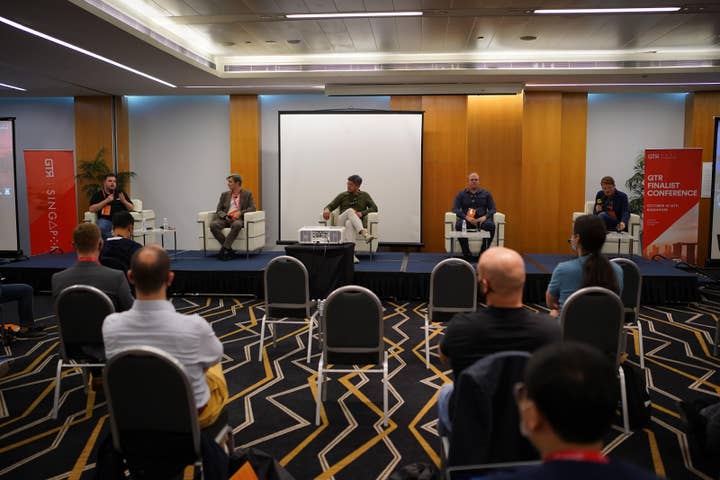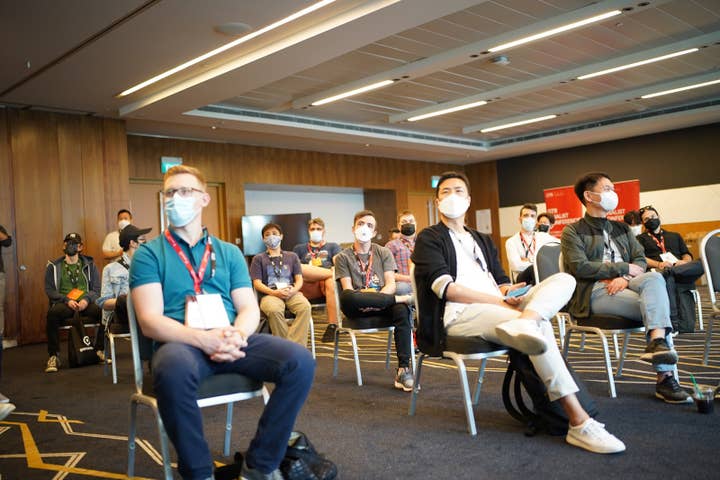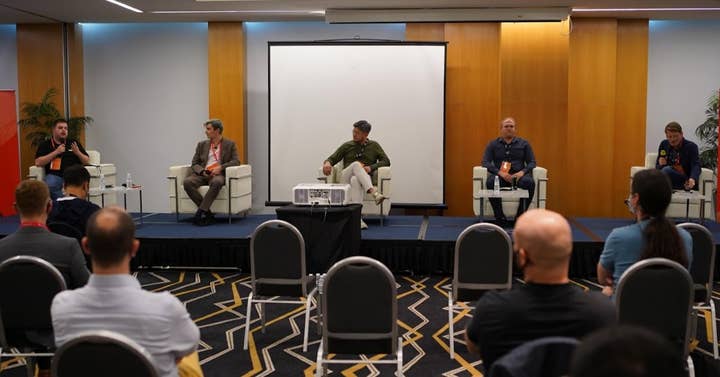Finding a publisher in a pandemic: How to stand out in a sea of Zoom calls and digital events
Publishers discuss how to make your pitch more memorable, and the risks and rewards of platform holder deals
In an ideal world, developers would be able to pitch publishers face-to-face at GDC or at some other industry event. And while COVID-19 made that scenario impossible for a lot of studios, it didn't slow down the publishing cycle as much as one would think.
At the 2021 Global Top Round conference in Singapore, Colin Donaldson (business development manager at Lunar Owl Consulting), Jan Halwe (head of licensing at Gamigo Group), Vladislav Tsopljak (co-founder of Neon Doctrine), and Joseph Woo (global business development executive at Potato Play) talked about the current challenges around publishing, and how indie studios can increase their chances of being picked up.
As with every other company around the world, the panelists had to make some adjustments due to the pandemic. But for the most part, they've had no trouble signing new studios over the last year and a half.
Back to basics
One thing COVID-19 hasn't changed is the importance of a clear and realistic pitch deck, preferably one that breaks down your budget and doesn't have mistakes or exaggerated percentages about the potential of your game. Some companies, like mobile games publisher Potato Play, are very data driven and want to see detailed metrics first and foremost. But Woo said if you don't have that kind of data yet, a playable build of the game will also suffice.
Neon Doctrine, which publishes indie games on PC and consoles, prefers shorter pitches that get straight to the point, around five to ten minutes long. It wants to know what you've accomplished so far, what kind of support you need, and what you're looking for in a publishing partner. A playable demo is also a must.
"Progress is super attractive, and all the developers I've seen that make that kind of progress got picked up one way or another"
Colin Donaldson, Lunar Owl Consulting
"When you send the pitch, don't tell us your life story," said Tsopljak. "I don't need to listen for 15 to 20 minutes about how you and your brother grew up in wherever. We can get to that later when you sign the game and we become friends. We get so many pitches on a daily basis that we just don't have enough time to immerse ourselves in these stories."
Lunar Owl Consulting isn't a publisher -- it provides indie studios with business development expertise -- but it also has its own preferences when it comes to working with new clients. According to Donaldson, the team is attracted to games that feel familiar (either with its genre or mechanics), yet are also just different enough to create compelling new experiences. Lunar Owl believes that a bit of difference can help the game stand out.
"[Developers are] mixing something familiar so people can come into [the game], and they're not completely blind," Donaldson said. "But then there's something on top of it that makes it different, that allows publishers to be able to market it to some capacity."

Potato Play prefers more familiar games for its mobile portfolio as well, but Woo said he also likes to see some kind of new angle to them. When he searches online for potential partners, he looks at pictures and videos to help him understand what the games are about. The best games, he said, are those that have a unique hook, something that makes him want to learn more about them.
"By looking at games that are quite similar [to others], we have a rough idea of who the audience is, what they like, what they don't, what works, and what doesn't work... And then there will be something different," Woo added. "We call it incremental creativity: take something that works and build something [new] on top."
But if you don't get picked up right away after a pitch, that doesn't mean the door is closed forever. In his experience, Donaldson found that if a publisher passes on you the first time around, you should still keep making improvements on your game. Those who stagnate or make excuses simply won't get funding, he said. If you return to the publishing team months later and can show that you were able to incorporate their feedback, you have a much higher chance of closing a deal.
"The question [for the publisher] becomes, 'Well, if you did that with limited resources, what's going to happen when I give you all the money in the world?' ... Progress is super attractive, and all the developers I've seen that make that kind of progress got picked up one way or another," Donaldson explained.
Cutting through the (virtual) noise
All the panelists agreed that the switch to working from home was both a blessing and a curse. On the one hand, publishers are much more reachable now thanks to digital events and social media. But that accessibility also means there is an influx of pitches coming through, and developers can easily get lost in the shuffle or just passed over completely if they commit too many mistakes.
"The longer it takes for me to find the contact address, the less likely it is that I actually end up contacting you because it just takes so much time"
Jan Halwe, Gamigo Group
For Neon Doctrine, virtual meetings have been the norm since before the pandemic. Tsopljak said he hasn't even met most of the developers he's spoken to. The company already did most of its work remotely because many of its development partners live in Southeast Asia and South America, and traveling to overseas events would be too expensive or too complicated for them due to strict visa requirements.
But with so many more pitches to filter through now, Tsopljak advised that it's more crucial than ever to "do your due diligence" and make sure that your game fits in with a publisher's priorities. As an example, he said Neon Doctrine is focused on bloody horror games, so trying to pitch a casual mobile game to his team would just be a waste of time for both sides.
The ubiquity of Zoom and other video calls also make it harder for developers to stand out. This is why Lunar Owl tells its clients that they need to go the extra mile to distinguish themselves from the countless other Zoom calls that a publisher does in any given week. Donaldson told a story of how one developer he's working with always has a whiteboard behind him, and he writes the name of the company he's meeting with, as well as the names of the other people who are on the call. Then at the beginning of the Zoom meeting, the developer lets the others know how familiar he is with their work. That tactic helped him make a memorable impression with publishers.
"During the pandemic, we said, 'Hey look, you can't meet with people in person, but the reality is no one else can. So what are you gonna do?' And we would [tell them] that in Zoom meetings, you're gonna have to outshine your competition," said Donaldson.
Other little things can help out as well, even in just your online presence. For Gamigo, Halwe likes to go through a studio's website to look for contact information, but sometimes he doesn't find any email addresses on there. And while he doesn't mind going through Twitter or Discord to find out, he warned that the added legwork can turn off a lot of publishers due to the sheer volume of pitches they receive.
"The longer it takes for me to find the contact address, the less likely it is that I actually end up contacting you because it just takes so much time," Halwe said.

The same advice applies when attending digital conferences. These virtual settings make it easier than ever for anyone to participate, but Potato Play's Woo noted that this also makes it harder for the developer to cut through the noise when trying to book meetings with publishers. As with his website example, Halwe said developers should fill out their conference profiles with as much information as they can, including contact info and a description about their game.
Tsopljak suggested going one step further by putting a pitch deck in the profile as well. He declined many online meetings in the past because he saw that the profiles were empty or hardly had any information in them. The implication from the panelists was that these basic tips can go a long way in convincing a publisher to accept your appointment or to reply to your message.
Know your worth
The conversation then steered into the pros and cons of signing exclusivity contracts, either on a specific platform or with subscription services like Xbox Game Pass and Apple Arcade. Donaldson said that while the money might be tempting, developers should take the time to evaluate if these deals (including any restrictions that come with them) will actually benefit their studio.
Lunar Owl has had several indie developers sign such deals in the past, and in some cases, he said it made perfect sense.
"When you send the pitch, don't tell us your life story. We can get to that later when you sign the game and we become friends"
Vladislav Tsopljak, Neon Doctrine
"I think for a developer, for their first project, to get one of those deals where they get a lump sum for the first game to go on a streaming platform, is great," Donaldson added. "It could provide for their next game and everything."
For other types of developers, however, he thinks exclusivity can actually harm their long-term goals. One of his main concerns was that lump sum contracts might remove another source of revenue in the form of back end royalties. For this and other reasons, Lunar Owl sometimes tells its developers that they shouldn't accept the deal. But they don't always listen.
"We're telling them not to do it. We don't think it aligns with their goals and their strategies. We keep telling them, 'That's not what you told us your vision is.' They do it anyway, and I think it's because of desperation," Donaldson said.
Tsopljak echoed that cautionary approach. He told the developers in the audience that if any of the major platform holders come up to them with bags of money and a contract, they should have a lawyer or at least some other outside party to help them go through the fine print. He said it's very easy for companies to "suck you dry and throw [you] away."
He warned that developers should also be aware of how real life catastrophes can affect publishing deals. To illustrate his point, Tsopljak told the story of an Australian studio that had an exclusive deal with PlayStation for a game he described as a satire of American gun culture. He claimed Sony was ready to help the developers with a huge marketing campaign.
Unfortunately, the game launched shortly after a horrific school shooting in the US, which caused Sony to abruptly pull all of its support.
"And that's it, they got buried. The game got released, but like hush-hush, under the table, and it just died. They lost like hundreds of thousands of dollars," said Tsopljak.
While an extreme example of how world events can affect a game's release, Tsopljak said that it's still something to be mindful of when signing with the major platform holders. This also wasn't the first time Neon Doctrine has been open about PlayStation's shortcomings. In a viral Twitter thread from earlier this year, Tsopljak's fellow co-founder, Iain Garner, criticized the way Sony treats indie studios.
But it wasn't all doom and gloom from Tsopljak. He brought up how Microsoft "always" offers good deals when it comes to Game Pass (one of Neon Doctrine's games, Sinner: Sacrifice for Redemption, used to be on the service). In the past, the publisher also struck deals with Epic Games Store and Discord, and Tsopljak said that the money the developers received saved their studios and helped them finish their games.
As a final note on the topic, Gamigo's Halwe added that if a developer does try to go after that kind of lump sum contract, they should make sure that they're not being taken advantage of. He referred to the leaked documents from the Epic vs Apple trial, and how that information can be used to determine your worth. One chart in particular showed how much Epic paid to different studios in exchange for offering their games for free on Epic Games Store.
"So it's really up to you to pick your poison and make the most out of your value and not just go, 'Oh we're a small indie, maybe [asking for] $50,000 is a little bit too much because we haven't sold that much yet and it will be a huge opportunity,'" said Halwe. "No. Know your value, and try to negotiate with [the platform holders]."
Disclosure: GamesIndustry.biz attended GTR 2021 with help from the organizers. Homepage image by Mohamed Hasan via Pixabay.
